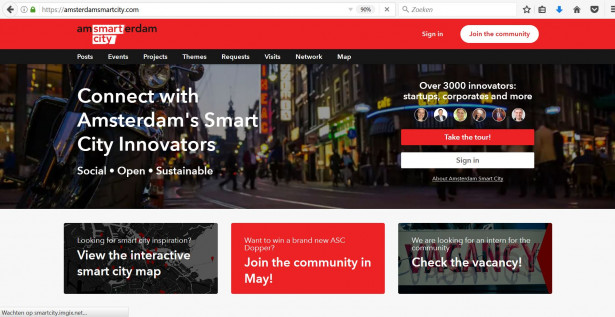Stay in the know on all smart updates of your favorite topics.
Demoday #22: Data Commons Collective
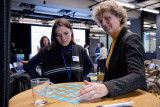
In the big tech-dominated era, data has been commercially exploited for so long that it is now hard to imagine that data sharing might also benefit the community. Yet that is what a collective of businesses, governments, social institutions and residents in Amsterdam aim to do. Sharing more data to better care for the city. On behalf of the Data Commons Collective, Lia Hsu (Strategic Advisor at Amsterdam Economic Board) asked the Amsterdam Smart City network for input and feedback on their Data Commons initiative on the last Demoday of 2023.
What is a (data) common?
Commons are natural resources that are accessible to everyone within a community. Water. Fertile soil. Clean air. Actually everything the earth has given us. We as humanity have increasingly begun to exploit these commons in our pursuit of power and profit maximisation. As a result, we risk exhausting them.
Data is a new, digital resource: a valuable commodity that can be used to improve products and services. Data can thus also be used for the common good. However there are two important differences between a common and a data common: data in commons never runs out, and data in commons is not tied to any geographical location or sociocultural groups.
Four principles for Data Commons
The Data Commons collective is currently working on different applied use cases to understand how data commons can help with concrete solutions to pressing societal problems in the areas of energy, green urban development, mobility, health and culture. Each data commons serves a different purpose and requires a different implementation, but there are four principles that are always the same:
- The data common is used to serve a public or community purpose
- The data common requires cooperation between different parties, such as individuals, companies or public institutions
- The data common is managed according to principles that are acceptable to users and that define who may access the data commons under what conditions, in what ways they may be used, for what purpose, what is meant by data misuse
- The data common is embedded to manage data quality, but also to monitor compliance with the principles and ensure that data misuse is also noticed and that an appropriate response (such as a reprimand, penalty or fine) follows.
The Data Commons Collective is now in the process of developing a framework, which provides a self-assessment tool to guide the formation of Data Commons initiatives by triggering consideration of relevant aspects for creating a data commons. It is a means of reflection, rather than prescription, to encourage sustainable and responsible data initiatives.
Energy Data Commons case and Value Workshop by Waag
After the introduction to the Data Commons Collective and Framework by Simone van der Burg (Waag) and Roos de Jong (Deloitte), the participants engaged in a value workshop led by Simone. The case we worked with: we’re dealing with a shortage of affordable and clean energy. Congestion issues are only expected to get worse, due to increased energy use by households en businesses. An energy Data Commons in neighbourhoods can have certain benefits. Such as preventing congestion issues, using clean energy sources more effectively, becoming self-sufficient as a neighbourhood and reducing costs. But under what circumstances would we want to share our energy data with our neighbours? What are the values that we find important when it comes to sharing our energy data?
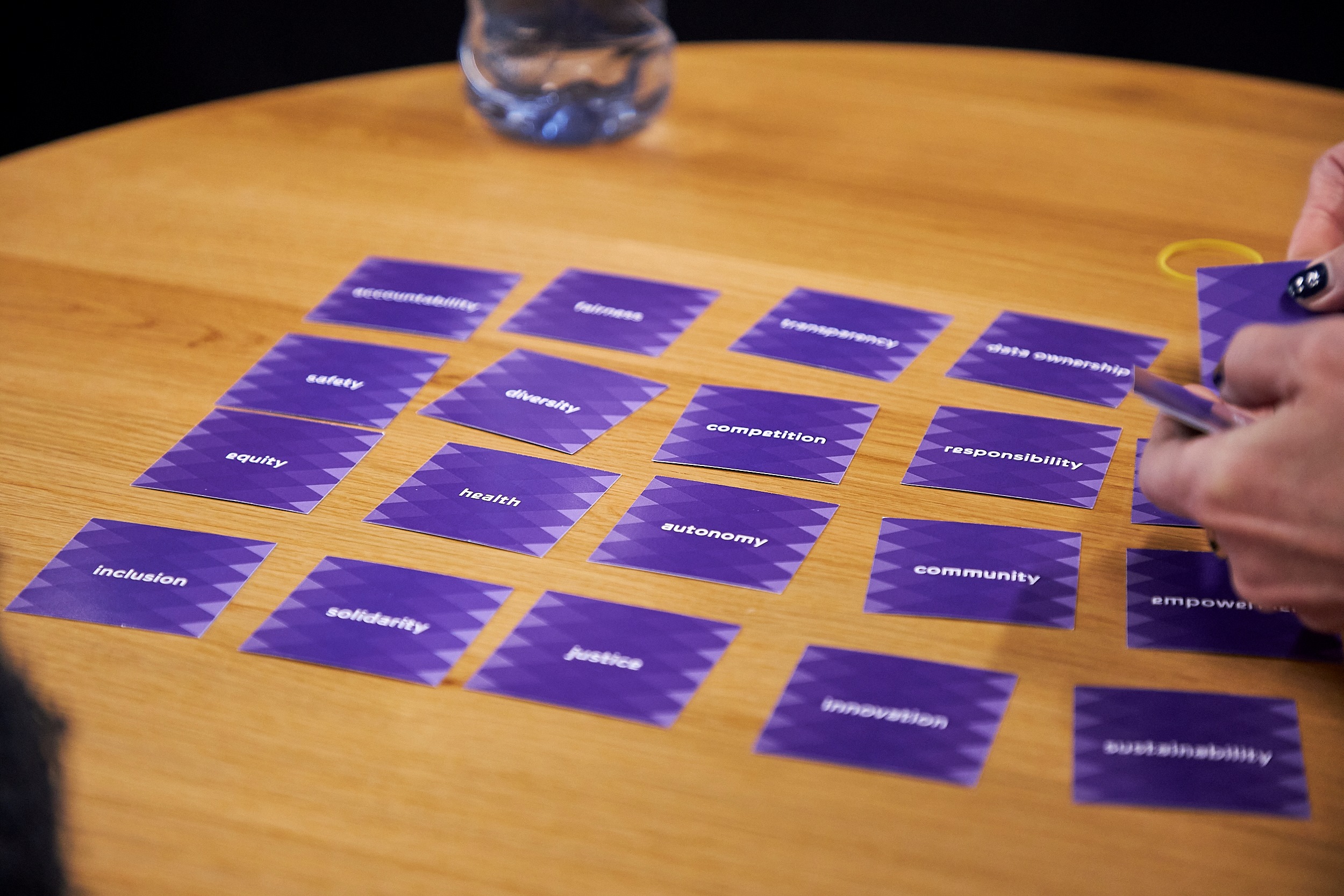
Results: Which values are important when sharing our energy data?
In smaller groups, the participants discussed which values they found important for an energy data common using a value card deck from Waag. Some values that were mentioned were:
- Trustworthiness: It is important to trust one another when sharing our energy data. It helps when we assume that everyone that is part of the common has the right intentions.
- Fun: The energy Data Commons should be fun and positive! The participants discussed gamification and rewards as part of the common.
- Knowledge: One of the goals of sharing data with each other is to gain more knowledge about energy consumption and saving.
- Justice and solidarity: If everyone in the common feels safe and acknowledged, it will benefit the outcome. Everyone in the common should be treated equally.
- Inclusion and Community-feeling: It is important that people feel involved in the project. The Data Commons should improve our lives, make it more sustainable but also progress our social relations.
During this Demoday, we got to know the Data Commons collective and experienced which values we find important when sharing our data with others. Amsterdam Economic Board will remain involved in the Data Commons Collective in a coordinating role and work on use cases to understand how data commons can work for society.
Would you like to know more about the Data Commons Collective or do you have any input for them? Please feel free to reach out to me via sophie@amsterdamsmartcity.com or leave a comment below.
Recap of Demoday #22
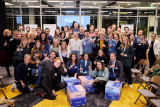
On Thursday December 14th, Amsterdam Smart City partners concluded 2023 with an afternoon full of inspiration, exchange and connections at our 22nd Demoday! Our partner Deloitte welcomed our network in The Garage, where their ‘Deloitte Studios’ department is located. In this article, we’ll give you a quick overview of the Knowledge Session, Work Sessions and Pitches. Interesting in learning more? Read the full reports by our Programme Managers Noor, Pelle and Sophie (linked below).
About our Demodays
The Demodays are one of the tools we use to stimulate innovation and encourage connection between our partners and community. The purpose of the Demodays is to present the progress of various innovation projects, ask for help, share dilemmas and involve more partners to take these projects to the next level. More information about the Demodays can be found here.
Knowledge Session: Change in the here and now, with Theory U
To kick-off our final Demoday of 2023, our brand-new partner Hieroo led an inspiring knowledge session about the change method they use for social innovation in the city: Theory U. Dorien Schneider and Maartje Krijnen taught us more about this methodology and how it can help us solve complex problems by shifting from ego to eco-thinking. Read the full report here.
Work sessions
After the plenary Knowledge Session we split up in different worksessions, each exploring regional innovation challenges. As always, we had set up the sessions’ topics and moderation in collaboration with our partners.
Mobility | Decision-making along the principles of Inclusive Prosperity – Jurhan Kwee (Municipality of Amsterdam)
In The Netherlands, the concept of ‘Inclusive Prosperity’ is on the rise. Policy makers are busy defining this concept, figuring out how to put this concept into practice and what it means for their decision-making process. Together with his colleagues at the Municipality of Amsterdam, Yurhan Kwee hosts sessions on decision-making along the principles of Inclusive Prosperity. With the input he gathers, he hopes to make the decisions needed for our Inclusive Prosperity ambitions more understandable and transparent, both for Amsterdam’s administrators and councillors as well as its citizens. Read Pelle’s recap article here.
Digital | Data Commons Collective: Using data for a liveable city – Lia Hsu (Amsterdam Economic Board) and Simone van der Burg (Waag)
In the big tech-dominated era, data has been commercially exploited for so long that it is now hard to imagine that data sharing might also benefit the community. Yet that is what a collective of businesses, governments, social institutions and residents in Amsterdam aim to do. Sharing more data to better care for the city. On behalf of the Data Commons Collective, Lia Hsu (Strategic Advisor at Amsterdam Economic Board) asked the Amsterdam Smart City network for input and feedback on their Data Commons initiative. Read Sophie's recap article here.
Energy | How can we continue to facilitate the homeowner in driving the energy transition? | Wouter van Rooijen (Alliander)
Wouter van Rooijen (Alliander) discussed the challenges related to grid congestion. From 2030 onwards, it is expected that a significant portion of the low-voltage network will experience both over- and under-voltage. While the network will be reinforced as quickly as possible, the lack of labour capacity is also prompting the consideration of alternative solutions.
The solution that emerged from Wouter's co-creation process was WijkWise. In this work session, Wouter aimed to validate the WijkWise concept and find parties that could contribute to its development and market implementation. Dave van Loon from Kennisland moderated the session. Read Noor’s recap article here.
Circular | Navigating eco-emotions: The impact of working in sustainability on your mental wellbeing| Marian Zandbergen (Hogeschool van Amsterdam)
This work session, led by Marian Zandbergen (CIRCOLLAB, HvA) and moderated by Mareille de Bloois (Royal HaskoningDHV), explored the challenges and opportunities associated with eco-emotions, both personally and within organizations. The key question addressed was: How can individuals and organisations constructively manage eco-emotions, and what implications does this have for organisations? Read Noor’s recap article here.
Pitches
To end this festive afternoon and the year 2023 as a whole, we invited project owners and -members to present their progress and next steps on topics brought in during our events and deep-dives throughout 2023. The following projects were presented. You can read more about these topics on their dedicated articles and project pages, linked below.
Local Energy Systems: Where we started, what we have achieved, and what are the next steps – Omar Shafqat (University of Applied Sciences Amsterdam)
Connecting the resource- and energy transition – Edwin Oskam (MRA)
ChatGPT and the government: Possibilities and impact on our work – Jeroen Silvis (Province of North Holland)
Floating urban districts: Future-proof living in the Metropolitan Region – Joke Dufourmont (AMS Institute)
Mobility Justice: Raising the topic of Mobility Poverty and the working group’s progress – Bas Gerbrandy (Province of North Holland)
Our next Demoday will take place in April. Do you have an inspiring story or project you want to pitch to the Amsterdam Smart City network? Let us know via sophie@amsterdamsmartcity.com
ICC Phase 2: Kick off in Brussels

The Intelligent Cities Challenge (ICC) is one of the European Commission’s largest city support initiatives supporting European cities in their green and digital transitions. ICC delivers knowledge and support services to cities and their local economies to address two major challenges: making the transition to a net-zero economic model, while enabling social inclusion and sustainable development for every EU citizen.
Cities learn how to address these challenges through Local Green Deals: integrated, multi-disciplinary action plans to lead the green and digital transition across sectors from the built environment, urban mobility and renewable energy systems to tourism or small retailers. Cities become members of a vibrant network, gain access to advisory services, innovation and sustainability management techniques, cutting-edge technology and training and get inspiration and advice from peers and mentor cities.
Building on the success of the previous edition of the ICC programme (2020-22) and Digital Cities Challenge (2017-19), the ICC will now enter Phase 2!
Amsterdam as a Mentor City
Like previous years, Amsterdam has been selected to join the support programme as a mentor city. The city will play a leading support role by guiding the 64 core cities as they embark on their two year journey to create impactful strategies and develop innovative solutions that will place the cities at the forefront of the green and digital twin transition through Local Green Deals. A nice compliment, allowing the Amsterdam Region to share their experiences and learnings from setting up Local Green Deal initiatives over the past years.
The Intelligent Cities Challenge Strategy City Lab: Accelerating the Twin Transition (November 2023)
On 23 and 24 November 2023, over 200 people - a mix of Intelligent Cities Challenge (ICC) core and mentor cities, political leaders and representatives from European institutions gathered for the first time in-person to discuss the status quo of Twin Transition. Through examples and best practices, attendees had the honour to hear from over 30 speakers as they shared insights into collaboration methods, Local Green Deals, climate ambitions, digital transitions and more across the course of 20 sessions.
Amsterdam Smart CIty's Leonie van den Beuken travelled to this gathering in Brussels as one of the representatives of the Amsterdam Region. She summarized her trip as follows:
This EU program helps cities from north to south, east and west to connect, share and learn. A much needed interaction, as we all try to improve the quality of life of our citizens. We all struggle with the ever rising cost of living. And we all want to get our cities to become more sustainable.
None of this comes easy, but we all know that local collaboration plays a key role. Building local coalitions between government, businesses and citizens is one thing, but how do we make sure these so called coalitions of the willing actually become coalitions of the doing?
Some of the learnings we shared from the Amsterdam Region are; the need for political support and the importance of trust and respect.
Local political leadership will inspire and guide society and entrepreneurs to invest and contribute. However, make sure pilotical support doesn’t evolve into political ownership. When that happens, societal parties and businesses tend to step out the coalition.
Take the importance of trust and respect seriously. You need to show long term commitment, take time to create understanding between parties. Take competition between participating SME’s serious and define together how to handle this together. Create a workflow in which smaller parties are allowed to participate less intense but sill feel incorporated.
We'll keep you up to date on our participation in future gatherings and results from ICC Phase 2. Want to know more? Check https://www.intelligentcitieschallenge.eu/
Demoday #20: ChatGPT and the Government: Opportunities and challenges
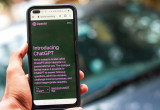
Are language processing tools powered by AI, such as ChatGPT, revolutionising the way we work and live together? How should governments, such as the province of North Holland, deal with this? What is the impact as the technology behind ChatGPT evolves and is used more and more prominently, outside and within their own organisations? Is it an efficient way to communicate with citizens, write policy documents, or answer state questions? Or should we avoid or discourage the use of ChatGPT for governments? During Demo Day #20, we explored the possibilities and potential impact of ChatGPT on the work of governments. We will discuss not only the technology itself, but especially the ethical aspects involved. How can officials be included in the responsible use of this technology?
Case & Set-up of the Session
After an introduction of the question by the Jeroen Silvis and Martijn Veerman from the province of North-Holland, the participants first identified opportunities and threats when using ChatGPT for a concrete case study: writing a housing vision for the region using ChatGPT. The opportunities and threats were identified from perspectives: political administrators, civil servants working for the province and municipality, citizens and housing developers and associations. After this round of identifying opportunities & threats, the participants discussed some important factors the province of North Holland should keep in mind when developing a framework for the use of ChatGPT.
Insights
Opportunities for political administrators, civil servants working for the province and municipality, citizens and housing developers:
Make civil service more efficient and effective; compose and read policy documents;
Civil servants working for the province can save a lot of time as ChatGPT makes it easier to write large policy document; it can also serve as a source for creativity and inspiration;
ChatGPT could be beneficial for civil servants working for municipalities, as ChatGPT might help simplify complicated documents;
Citizens benefit as complicated plans become more readable and accessible through the use of ChatGPT;
ChatGPT could help broaden visions for area development and housing (in this specific case) which is beneficial to housing developers.
Threats for political administrators, civil servants working for the province and municipality, citizens and housing developers:
Through using ChatGPT, internal and privacy-sensitive information will be in hands of big tech multinationals, which is a big risk for political administrators; dependence on AI might lead to a loss of autonomy;
Using ChatGPT for writing policies might lead to tunnel vision for civil servants working for the province; Does the policy fully reflect the vision of the civil servant when using ChatGPT?;
ChatGPT makes use of existing content, which may lead to less innovation. This is a risk for civil servants working for the municipality as they have to execute the policy;
Citizens might worry about their privacy, as ChatGPT is owned by a big tech multinational;
ChatGPT might simplify housing visions whilst the realisation of housing is a complex issue, this is a threat for housing developers.
After identifying the opportunities & threats, the participants discussed what the province of North Holland should keep in mind for the development of a ChatGPT framework for internal use. Some remarks from the group:
Always remain critical and check everything, make sure to identify your sources;
Pay attention to public values and explore open-source language model alternatives that are more responsible and open source. Be aware of the influence of big tech;
Provide clear frameworks and instructions for the use of ChatGPT or a similar tool;
Make clear rules about who is responsible;
Knowledge and experience is also within people, not everything is public or published and thus accessible for ChatGPT;
Learn to ask the right questions: what is the input for ChatGPT? Educate your colleagues about the use, the do’s and don’ts;
Hire ChatGPT expert(s) and organise internal strategy sessions;
Be transparent about the use of ChatGPT within the government;
Choose for one tool, preferably open-source, that can be used organisation-wide.
Conclusion and Next Steps?
It is clear that the technology around AI powered language models is developing very quickly. As colleagues of the province of North Holland are already using ChatGPT, it is important to develop a framework for internal use. Jeroen and Martijn from the province of North Holland will use the concrete input from this session and work on plan/framework the coming months. It is unclear whether this question will have next step within the Amsterdam Smart City network, but a valuable connection has been made between the University of Applied Sciences of Amsterdam and the province of North Holland. Do you have any input for Jeroen and Martijn about this topic? Please contact me via sophie@amsterdamsmartcity.com, or leave a comment below.
Today’s Changemakers #1, Romy Dekker: Using Digital Technologies in The Energy Transition

In Today’s Changemakers, we talk with pioneers in our network who are all, in their own way, shaping the city and region of the future. Our first interviewee is Romy Dekker, senior researcher at the Rathenau Instituut. She studied Cultural Anthropology and Development Sociology at Leiden University, where she quickly learned that our societal drive for growth comes at the expense of our planet, and that development does not always mean improvement for all. This insight motivated Romy to combine her interest in science with sustainability. Currently, she works as a senior researcher on topics at the intersection of sustainability, digitalisation and democracy. Her latest work caught our attention. She just started a study on how new technologies, such as Digital Twins, can contribute to tackle societal challenges in the built environment. The following paragraphs describe our insightful conversation about the complexities when using digital technology, her first learnings, and personal ambitions.
In Romy's work, she looks at the role of data and digitalisation in the energy transition in two ways. The first is data as an enabler for a just energy transition.
“The convergence of sustainability transitions and the digitisation of society represents two of the most defining trends of our era. The intersection of these trends has a significant impact on society. The Rathenau Instituut wants to provide tools for a broad discussion about what is needed to use digital technology and data for just sustainability transitions.”
“In our report Stroom van Data, we investigated how data can be used for a just energy transition. It's becoming increasingly clear that data are indispensable for the energy transition. Data can help with keeping the energy system affordable, reliable and clean, for example by better aligning the demand for and supply of energy and by providing citizens insights into their energy behaviour. However, there are also genuine concerns about citizens' control over their data, the cybersecurity of the energy supply, the environmental impact of digital technologies and the distribution of benefits and burdens of a digitalized energy-market. Addressing these issues is necessary to achieve a socially responsible energy transition.”
The second approach concerns how digital technologies, specifically Digital Twins* (definition can be found at the end of this page), can contribute to decision-making regarding spatial planning for sustainability challenges, such as the energy transition. Are Digital Twins merely a hype or a hope?
“Urgent societal challenges are often interdependent, meaning that an intervention in one area can have an impact on another; a decision to build a house somewhere, for example, has an impact on achieving other urgent energy, water, and climate goals. To tackle this complexity and improve the information available to stakeholders, public and private parties turn to data and digital technologies, and more specifically to Digital Twins.”
“However, as digital technologies and data are neither neutral nor apolitical, it is important to remain critical on how Digital Twins can contribute to tackling societal problems. The use of Digital Twins in decision-making and governance may influence our definition and understanding of problems. Consequently, it may determine what is governed, who has the ability to exercise power and be involved, and how we act. Ultimately, this can determine if social challenges are genuinely and fairly addressed. When simulating an urban region, there are also many ecological, social and political-economic aspects. How do you take these factors, which cannot easily be measured, into account?”
“Because the Digital Twin is gaining popularity as a tool for decision-making, the Rathenau Instituut will investigate how such technologies can contribute to tackling societal challenges in the built environment. Can Digital Twins help to make more integral decisions and engage citizens and other relevant stakeholders in decision-making? And if so, how? What are risks associated with using these technologies and how can they be mitigated?”
Romy’s considerations for the Amsterdam Smart City community
“A bit of an open door, but nonetheless very important; technology is a means and not an end in itself. It is important that its use takes place in a responsible manner, with an eye on public values such as equality, fairness, and democratic governance and that it is carefully considered how its use contributes to the urgent societal challenges we face. Finally, public involvement in sustainability transitions is important, but only if it takes place in a meaningful way. Otherwise, it can do more harm than good. This requires a clear answer to questions such as: is it clear what the purpose and process of public participation are and what will be done with the input?”
Using science to tackle societal challenges
“I used to doubt whether I wanted to work as a scientist or not. Because although scientists do very important work, they can sometimes be a bit disconnected from concrete societal issues, causing their work to lose relevance. I like how at the Rathenau Instituut, we really stand between science, politics and society. We want to make scientific insights accessible to a wider audience, and also actively involve citizens through participatory methods. It motivates me that in my work, I’m increasingly looking at how science, technology and innovation can contribute to tackling major societal challenges in a just way.”
“My dream for the urban region of the future? A liveable city for both humans and non-humans that operates within planetary boundaries and ensures an equitable distribution of both burdens and benefits.”
Romy and her colleagues recently started their research on using digital technologies, including Digital Twins, to address societal challenges that come together in a specific (urban or regional) area. Are you currently working on a Digital Twin project, or as a policymaker interested in the use of Digital Twins but facing certain challenges? And would you like to contribute to Romy’s research? Shoot our community manager Sophie (sophie@amsterdamsmartcity.com) a message and she will connect you with Romy!
*A digital twin (DT) can be seen as a virtual representation of a physical product, process or (eco)system. They can be used to simulate how a physical object or system will perform under different conditions and scenarios, allowing for a better understanding and optimization of processes.
Amsterdam Smart City partners aan de slag met drie urgente maatschappelijke challenges
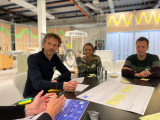
Hoe zet je de mens centraal in digitalisering? Hoe voorkom je uitsluiting van mensen die vervoer niet meer kunnen betalen? Hoe ontwikkel je samen lokale energiesystemen? Amsterdam Smart City werkt met 27 partners in co-creatie aan deze drie belangrijke vraagstukken.
Van digivaardige mensen naar mensvaardige digitalisering
Technologische en innovatieve ontwikkelingen volgen elkaar steeds sneller op. Als overheid wil en moet je hierin meegaan. Tegelijk leidt de inzet van digitalisering en data vaak tot ongewenste resultaten, wat de afstand tussen inwoners/ondernemers en de overheid vergroot.
Gemeente Haarlemmermeer verschuift haar focus van ‘het systeem staat centraal, mensen moeten maar digivaardig worden’ naar ‘de mens staat centraal, onze systemen moeten mensvaardig worden’. De onderliggende vraag is hoe zet je de mens écht centraal in digitalisering en het vormgeven van digitale systemen? De gemeente Haarlemmermeer zou graag samen optrekken om deze vragen uit te werken tot een advies dat breder inzetbaar is.
Mobiliteitsarmoede: hoe voorkomen we uitsluiting van mensen in het mobiliteitssysteem?
Stijgende benzine- en elektriciteitsprijzen; de toenemende digitalisering en afname van het openbaar vervoeraanbod zorgen er, onder andere, voor dat steeds meer mensen problemen hebben om zich te verplaatsen. Verduurzaming en deelmobiliteit lijken niet voor iedereen weggelegd en maatregelen om dit te stimuleren werken het probleem mogelijk zelfs in de hand. Het risico op sociale uitsluiting wordt hierdoor groter.
De provincie Noord-Holland en DRIFT maken zich zorgen over mobiliteitsarmoede en vragen zich af wat we eraan kunnen doen om deze mensen mobiel te houden. Er is echter nog weinig bekend over de omvang van het probleem, de exacte doelgroepen en welk instrumentarium werkt (en wat vooral niet). Daarom willen we graag in gesprek met de partners om tot gezamenlijk inzicht en een afgestemde aanpak te komen.
Samenwerking voor ontwikkeling lokale energiesystemen
De milieuproblematiek en de huidige hoge energieprijzen zorgen voor een snelle omschakeling van gas naar elektriciteit. Dat is de afgelopen jaren veel sneller gegaan dan voorzien, met netcongestie als gevolg.
Door samenwerking tussen lokale partijen kan er een zo optimaal mogelijk energiesysteem gecreëerd worden. Dat kan het elektriciteitsnetwerk ontlasten en, bijvoorbeeld, het maximaal gebruik maken van duurzame bronnen stimuleren en de energiekosten drukken.
Dit vraagt een intensieve samenwerking waarbij elke partij wordt uitgedaagd om verder te denken dan de eigen belangen. Er zijn geen bestaande structuren of systemen waar dit binnen past. Alliander doet een oproep voor samenwerking op dit vraagstuk.
Sinds november werken we in verschillende werkgroepsessies toe naar nieuwe initiatieven om antwoorden te bieden op deze uitdagende kwesties. Wil je ook meedenken en deel uitmaken van oplossingen? Neem contact op met Sophie via sophie@amsterdamsmartcity.com.
Data Dilemma’s Recap: Fair data sharing with Amsterdam Data Exchange (AMdEX)
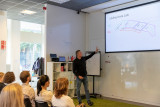
Data Dilemmas is a collaboration between Amsterdam Smart City and the City of Amsterdam’s Data Lab. During Data Dilemmas, we explore the possibilities for using data and new technologies to address urban and societal challenges, with a focus on responsible digitalization. The goal is to use data to make cities more safe, clean and accessible. But what happens to all the data that is collected? Which dilemmas do we encounter when we collect (personal) data to improve the city? These questions are important for everyone: governments, knowledge institutions, companies, and civil society. In the latest edition of Data Dilemmas, hosted on the 29th of September 2022, we invited Joep Meindertsma, Tom van Arman and Jan van Boesschoeten to take us through the experiences, dilemmas and lessons learned from the Amsterdam Data Exchange (AMdEX) initiative. Marit Hoefsloot from Waag gave a critical reflection on the presented Data Dilemmas.
Joep Meindertsma (Dexes) – Introduction to AMdEX
AMdEX is a collaboration between the Amsterdam Economic Board, AMS-IX, Dexes, the University of Amsterdam and Surf. AMdEX aims to give people more control over their data through a secure, trusted and neutral infrastructure which enables sharing data under specific conditions. AMdEX has two missions: give people more control over their data and make it more attractive to share data. These two missions are a data dilemma in itself.
Data exchange is currently monopolized by a handful of major players and the web is more centralized than ever before. The direct connections between people and organisations have become fewer. This is because we’re increasingly using middle-men, services between the data source and the user. Joep explains: “If you want to see someone’s vacation photos, you have to send a request to Facebook. Facebook owns the data, decides who can access it and dictates what the app looks like”. This problem is not limited to vacation photos or Facebook. It is about all our data. Almost all services are middle-men, with its own closed way of data sharing. This creates data silos – places where data is effectively locked away.
Joep refers to three types of data: “data we want to share, data we don’t want to share, and data we might want to share.” This ‘might share’ category often contains valuable data, but it can be costly or difficult to share. Set conditions makes sharing this data easier. AMdEX makes this possible through a few software projects they’re currently building: eFlint (a new language to describe legal constructs), DexPod (an open source personal data server) and Atomic Data (a specification and open source software to improve data interoperability).
Tom van Arman (Tapp) - AMdEX case study: Marineterrein Sensor Data
Meanwhile, the Marineterrein in Amsterdam is full of sensors, collecting all kinds of data. Think of MicroLAN measuring the water quality, or Public Eye collecting crowd data. Marineterrein is a ‘living lab’, where technologies that contribute to a sustainable and future-proof city can be tested. Together with AMdEX, Tom looked at how the collected data can be made accessible to third parties, such as researchers, journalists, students, artists and entrepreneurs. The Marineterrein and the data collectors, for example Public Eye, set conditions for the data to be used. Tom describes how this works in practice: “If a journalist is interested in using crowd data collected by Public Eye, they must be a member of the Marineterrein community and subscribed to AMdEX. If the journalists meets these requirements, they will receive an AMdEX email with a data download link.”
Jan van Boesschoeten (AMS-IX) - The Future of AMdEX
As Joep and Tom already mentioned, there are many questions around data: who owns the data, what are you allowed to do with it? How do you work together with your competitors to get more value out of your data? A data exchange can be a solution to these questions. This is why AMS-IX, a neutral member-based association that operates multiple interconnection platforms, is connected to AMdEX. Jan shortly describes the future of the AMdEX initiative. The field lab with use cases ends in June 2023, and at that time AMdEX also aims to be a legal entity. Additionally, one of their use cases involving KLM will be presented at AMS-IX’s MORE-IP community event in June. After that, AMdEX will onboard new use cases.
Marit Hoefsloot (Waag) – A critical reflection on the Dilemmas encountered in AMdEX
Last but not least, Marit Hoefsloot from Waag reflects on the dilemma’s presented by Joep, Tom and Jan. Marit describes that the use of data is often seen as an act of notion, whilst privacy is more of a passive notion (not using the data at all). However, it’s possible to use data whilst also protecting ones privacy. A good example of this is IRMA, a privacy-friendly digital wallet which can be used for authentication. As Marit pleads: “Data usage and privacy are not necessarily contradictory, it is about both.” Organisations should see protecting privacy as their own responsibility, instead of giving the illusion of consent with an opt-in or opt-out option.
The second dilemma Marit reflects on is about developer productivity vs. standardisation. Standardisation takes a lot of time, which takes away from innovation and productivity. However, you need standardisation to develop these kind of exchange platforms, as there are many organisations that are involved. Marit describes that the real questions we should talk about are: what is the flexibility of the standard? Do we create the standard together, or more top-down through legislation? Who are we standardizing for? “We should prioritise standardisation, but do it in an open and inclusive way.”
Would you like to join our next Data Dilemmas at Datalab? The upcoming session is scheduled on the 8th of December (topic and speakers to be announced). Keep an eye out on our platform for the programme!
Photography: Myrthe Polman
A new Amsterdam Smart City platform coming up!

You’re probably already familiar with our online platform to share your news, projects and events with the Amsterdam Smart City community. Or you use this website to find news about smart cities, check out upcoming events and read about our organisation.
There are some changes on the way… Soon we will launch a brand new platform!!
Amsterdamsmartcity.com
We all want to live and work in a healthy city and region, now and in the future. Cities are getting busier and we are experiencing the effects of climate change and pollution. That is why we need solutions to guarantee a livable future. Technology is not the challenge here. Real progress can be made in finding, connecting and collaborating with likeminded people and organizations.
Why a new platform
Four years ago the new amsterdamsmartcity.com was launched in the Johan Cruijff ArenA. Not your ordinary website, but a unique interactive platform in the smart city sector. To tackle the challenges we are facing in cities, we need each other. Our platform helped a smart city community to find each other, share, connect and make an impact together! Soon more than 600 people joined the community and shared their work to make better streets, neighbourhoods and cities. And the amount of people grew more and more.
The look and feel of the first ASC community platform, three years ago
Now, four years later the Amsterdam Smart City expanded to more than 8000 people, 300+ projects and organizations and daily contributions. The platform is visited by people from all over the world. We got in touch with a brand new group of innovators, made it possible to connect them to our existing community, grew a network. Now it’s time to innovate the platform for the innovators, right?!
What’s new?
The community is growing, contributions are increasing, and more information is displayed on the platform. Therefore we are making an alternative that improves the overview and gives you control over the e-mails that are sent. And because the smart city field is a diverse field, with lots of themes, challenges and angles, we will help you reach the content that is of your specific interest.
Furthermore we hope to show you more of the program of Amsterdam Smart City. We are an open innovation platform and workspace for partners and the community. We facilitate collaboration in various types of events, of which a lot is done offline. And we want to involve you more in what’s happening offline in the Amsterdam Metropolitan Area.
Welcome!
A platform that will give you a better overview, helps you to connect to likeminded people and looks great! A platform with personalized content and e-mails, but also the occasional outside-your-bubble content. In the onboarding we will help you to get to know all the features. But more on that later!
We are looking forward to welcoming you on the new platform from the 17th of November and look forward to your feedback!
Please note: the website will be offline for a while on the 12th of November. At the end of the day, we will be back with the new platform. As a member of our community, you will automatically receive an e-mail to reactivate your account.
MozFest's Call for Session Proposals is OPEN!

MozFest is a unique hybrid: part art, tech and society convening, part maker festival, and the premiere gathering for activists in diverse global movements fighting for a more humane digital world.
That’s why I’m excited to invite you and your community to participate in the first-ever virtual MozFest! There will also be a local taster event in Amsterdam.
Submit A Session Idea for MozFest This Year: mzl.la/proposals2021
We’re excited to use the programming that we’ve honed over a decade of festivals – participant-led sessions, immersive art exhibits, space for spontaneous conversations, inspiring Dialogues & Debates – to address current and global crises. Through our Call for Session Proposals (where you're invited to propose an interactive workshop to host at the festival), we’ll seek solutions together, through the lens of trustworthy artificial intelligence.
Anyone can submit a session – you don’t need any particular expertise, just a great project or idea and the desire to collaborate and learn from festival participants.
If you or someone you know is interested in leading a session at MozFest this year, you can submit your session idea here! The deadline is November 23.
Details and submission page: mzl.la/proposals2021
Join CityFlows Webinar #2 Big Data & IoT for Crowd Management on October 13

What are best practice and lessons learned when it comes to data collection and management for crowd management? CityFlows project partners will share their experience during the second CityFlows webinar on Tuesday, October 13. Join in and contribute to the discussion with fellow crowd management practitioners and researchers.
Program
11:50 – 12:00 Zoom meeting room open
12:00 – 12:05 Welcome & introductions
12:05 – 12:20 Best practices & lessons learned from Barcelona by Jordi Ortuño, Maziar Ahmadi & Chloe Cortés
12:20 – 12:35 Data source integration for tourism flows governance and safety by Mauro Annunziato & Piero De Sabbata
12:35 – 12:40 Reflection from Amsterdam
12:40 – 13:00 Q&A with the audience
13:00 Program end
For more information and registration visit the CityFlows project page: https://cityflows-project.eu/event/webinar-2/
Amsterdam and Helsinki first cities in the world to launch open AI register
The City of Amsterdam, Helsingin kaupunki – Helsingfors stad – City of Helsinki, in collaboration with Saidot, launched the first Public AI Register. The Algorithm Register is an overview of the artificial intelligence systems and algorithms used by the Cities of Amsterdam and Helsinki. Through the register, you can get acquainted with the quick overviews of the city's algorithmic systems or examine their more detailed information based on your own interests.
If you're interested in learning more, here's something for you. The new white paper that was co-written by Linda van de Fliert, Pasi Rautio and Meeri Haataja. They really hope this will part some conversation and most importantly, help other government organisations address #transparency and take their first steps in implementing #AI #governance.
You can also give feedback and thus participate in building human-centered algorithms in Amsterdam. The register is still under development.
WeMakeThe.City RESET: Digital Rights

After two successful editions, the WeMakeThe.City festival is heading for 2025 as a biennale: the 750th anniversary of Amsterdam. This year the uncertain future of our city and metropolitan region was discussed in a 12-hour livecast marathon on the 21st of September. The WeMakeThe.City theme ‘Reset’ brings together genius thinking, imagination and creativity to formulate alternative perspectives for action. How are we going to do things differently in the coming years? How do we work together to make our metropolis fairer, more inclusive, more sustainable, more climate-resilient, safer, more successful and happier? After all, together we make the city of, for and by everyone!
During last spring's lockdown, it became even clearer how much we depend on the digital world. We meet, chat and date in front of the screen. A solution to combat the spread of Covid-19 is also being sought in the digital domain. These developments have raised the privacy issue again: how can people's data rights be protected? Such as anonymity, transparency and control over data. Time for a good conversation about values and the importance of digital civil rights.
The session kicks off with Marleen Stikker, director of Waag and Ger Baron, Chief Technology Officer of the City of Amsterdam. Marleen explains what our digital human rights are. ‘These are the same rights just as in the analogue world. Where there is relatively much attention for analogue human rights, our civil rights in the digital domain have run wild, too little attention has been paid to this. Let's reclaim those rights! It is for example about the right to be forgotten, the right to be anonymous, but most important to me is digital sovereignty. Everyone should have the possibility to have insights in their own actions online.’
Ger agrees with Marleen. According to him, governments, and cities as well, collects too many data about residents and the public space without even knowing what they want to do with these data.’ The reason to collect them should be to learn something specific that you can improve or help people. Helping people with the collection of data also brings in new dilemmas. The city used to have a collaboration with energy providers for example. Once someone didn’t pay for the energy service, they sent out a message to the city administration. The City could then prevent someone get evicted from his/her home.
This example is not enough reason for Marleen to collect the data: ‘To me, this sounds as if we didn’t invest in our society. We could have helped these people as well if they had adequate supervision or guidance. In last years, we invested heavily in the digital domain and we made budget cuts on home care, debt counselling and community police officers. Digital solutions are not always the best solutions! Especially not when all kinds of companies have data without people knowing about this.’ Ger: ‘To a certain point I agree with this point. Digital rights also include rights to know about the data that is collected, why this is and what you can do about this. This is currenty not transparant at all, even though the City of Amsterdam is becoming more and more about about his.
Marleen: ‘I see the City of Amsterdam going in the right direction, by starting for example the Coalition for Digital Rights. However, the steps in this direction go really slow, especially in politics. This way, it remains unclear what rules companies dealing with personal data should obey. That’s why Marleen also calls on politicians in The Hague: guarantee digital human rights by imposing conditions on the market.’
Next up is Miram Rasch, researcher and teacher at the Amsterdam University of Applied Sciences and writer of the book ‘Friction. Ethics in times of dataism. Her book opens with a story about escaping the eyes of data collectors and algorithms. She states this is only possible at home. And even there, it becomes harder. ‘We have smart meters, smartphones, smart tvs. It is not clear why these devices need to collect data, with whom they share them. We don’t know now, but especially we don’t know in the future. Everybody has something to hide, because we don’t know yet what we should hide. Of course you have to inform yourself about the conditions you’re accepting. However, this is not easy at all. Try to read the Terms and Conditions of the services you use, the texts are too long and complicated. Unfortunately it can take a long before something changes. The few individuals who are conscious about the digital world, won’t change it. We need rules and regulations! But we know from the past, that maybe something heavy has to happen before people open their eyes.’
Jim Boevink, advisor Taskforce Digital Safety at the City of Amsterdam, starts an intermezzo about the right to be anonymous. Marleen Stikker: ‘People who want to abuse others, are free to hide themselves. This is because platforms are not responsible for the content their users post. They earn money with these users, they are their business models. But they they are not responsible for things happening on their platform. This is the first thing that has to change. The legal system is not in order. Make them responsible for the content on their platforms.’ M****arleen: ‘And good to emphasize: someone who is critical about the digital domain and the internet, is not necessarily against the digital world. We only have to make the internet safe and reliable!’
Want to watch the livecast (in Dutch) yourself? Check <https://dezwijger.nl/programma/reset-digital-rights>.
ModelMe3D - City Information Modeling !!!DEMO!!!

Howdy - this Friday 25.09 @12h we'll be giving a demo to show you MM3D - a new “white board” for city information modeling that can empower you or any other project stakeholders to plan, collaborate & share projects. In this webinar we’ll show you what all these features and functionalities mean for your own real-world projects. We’ll be using the Marineterrein (former navy base) in the heart of Amsterdam as our user case. Interested? Grab a sandwich and sign up here: bit.ly/MM3D_MT
Applications open: CATALYST 2020 live from New York - a three-week virtual program for Dutch scale-ups
We are calling all Dutch scale-ups with ambitions to scale internationally to apply for the BENELUX CATALYST 2020, a fast-paced three-week, no-equity based virtual accelerator program, taking place in November 2020 live from New York. Applications are now open!
The Consulate General of the Kingdom of the Netherlands and the Netherlands Enterprise Agency (RVO) are collaborating with partners in New York and from Belgium and Luxembourg for the Benelux Catalyst program, targeting high-growth tech scale-ups from the Benelux and working together to kick start their international growth.
About the program
The Benelux Catalyst is a three-week virtual accelerator program from November 2-20 2020 for scale-ups from the Netherlands, Belgium and Luxembourg. The program is designed to have a transformative impact on the mindset, ambition and international expansion strategies of participating companies. The daily virtual sessions are live from New York (Monday-Thursday), combining workshops, peer insights, office hours and on-demand content.
· Company specific matchmaking and personal introductions
· Presentations and workshops by experts and service providers
· Knowledge sharing and peer mentoring by fellow entrepreneurs
· Access to the larger NYC community through events
Program fee
Given the small cohort size and the tailor-made experience for this program, the Consulate General of the Kingdom of the Netherlands will select 2-3 Dutch scale-ups to participate in the program and sponsor the majority of the program fee per selected company. This means that selected Dutch scale-ups pay a contribution of €750 per selected company to join the Catalyst virtual accelerator program (November 2-20 2020).
Want to know more?
Have a look at the two-pager attached.
A Successful Launch of the CityFlows Webinar Series — Crowd Management in Times of Corona

On Tuesday, 8 September, forty-five participants gathered for the first CityFlows webinar on the topic of crowd-management in response to corona. Speakers came from three partner cities: Eelco Thiellier, Project Manager Crowd Monitoring System Amsterdam (CMSA); Valentino Sevino, Mobility Planning Director at City of Milan’s Environmental Mobility and Territory Agency (AMAT); and Aina Pedret, Mobility & Tourism Specialist at the City of Barcelona.
The participants were CityFlows project partners (37%), crowd-management researchers or academics (17%), crowd-management professionals working for public authorities (13%), crowd-management professionals working for companies or start-ups (10%), non-professionals interested in the topic (13%), and other (10%).
The meeting represented a successful launch of the EIT-KIC CityFlows webinar series which will continue with additional webinars in October, November and December.
Following a brief introduction to the CityFlows project, Eelco Thieller shared how the City of Amsterdam has quickly adapted its crowd monitoring infrastructure to respond to the corona crisis. Eelco showed the techniques that are used and how they are instituted throughout the city in crowded locations, or “hot spots”, such as shopping districts and market areas, the Red Light District, and in parks and at event locations. The focus is always on managing crowds or flows of people in the most privacy-preserving way with infrared sensors being a good example of how this is done in Vondelpark. Eelco also described the predictive models that were developed using the data which are helpful with determining what crowd-management actions should be undertaken by the City to ensure the health and safety of the residents and visitors.
Valentino Sevino shared a broader perspective on how the City of Milan has used data and modelling to respond to the corona emergency. Valentino showed how the modal-share in the city had drastically changed since the end of February through June as a result of the corona crisis. This shed light on levels on congestion throughout the city and showed a large reduction in all modalities during the lock down. Following the lock-down, public transport began operating at 25% which then required the city to undertake a complete rethinking of the mobility system with the goal of focusing on more temporal distribution, promotion of remote working, and promotion of active transport through street space reallocation to non-motorized transport. The data collected enabled them to predict and plan for different scenarios, especially considering the goal of abiding by social distancing guidelines during rush hours.
Aina Pedret from the City of Barcelona responded to the first two presentations by reflecting on the global challenge of ensuring confidence and safety for people in response to corona. To ensure this confidence and safety for both locals and tourists, the City of Barcelona is developing an application showing real time data of busyness at “hot spots”. And similar to the City of Amsterdam, the City of Barcelona is using cameras to monitor and manage occupancy and crowds at busy locations such as markets.
The webinar ended with an open discussion facilitated by Dorine Duives, CityFlows Principle Investigator at TU Delft.
Did you miss the webinar? It is possible to watch the recording via https://vimeo.com/460939134
___________________________________________________________________________________
CityFlows is an EIT-KIC project aims to improve the liveability of crowded pedestrian spaces through the use of Crowd Monitoring Decision Support Systems to manage pedestrian flows. The project is led by AMS Institute and brings together crowd-management and mobility practitioners and researchers in Amsterdam, Barcelona and Milan. The CityFlows project tests and evaluates various innovative crowd monitoring techniques in real-life settings where large crowds meet, such as mass events, tourist spaces and transfer hubs. The CityFlows project also prepares a CM-DSS for market launch which incorporates state-of-the-art monitoring techniques.
Join us for one or all of the next CityFlows webinars:
• Tuesday, 13 October, 2020 – 12:00-13:00 CET
• Tuesday, 3 November – 15:00-16:00 CET
• Tuesday, December 1 – 15:00-16:00 CET
Are you a practitioner or researcher working on a relevant crowd-management project and would like to share your work and findings with the CityFlows network? Send a short email explaining your project to CityFlows Communications Officer, Cornelia Dinca via cornelia.dinca@ams-institute.org.
High-tech solutions to the circular economy and digital citizenship
How can Distributed Ledger Technologies (DLT) and Blockchain contribute to a more transparent, sustainable and inclusive future?
As we launch the DLT4EU programme, we are having a panel discussion on the potential role and pitfalls of DLT in Europe. In the panel Indy Johar from Dark Matter Labs will join Piret Tõnurist, Innovation Lead at OECD - OCDE, and Ludovic Courcelas, Government Strategy Lead at ConsenSys. Together they will discuss how DLT and blockchain can encourage a more circular and democratic society.
Join us for this public online event on September 17th from 6pm CET.
More info on the DLT4EU programme: https://www.metabolic.nl/projects/dlt4eu/
Data Dilemmas: How to Get People to Use Contact Tracing Apps – event recap
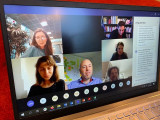
People around the globe are trying to fightCOVID-19 for months now and progress is made in developing ways to do so. While medicines and vaccines are being developed and testing facilities scaled up, we try to get a grip on the spread of the virus by doing contact-tracing. Up until now, the Netherlands have done so by tracing interactions of people who tested positive and informing them. To help determine the people who should be warned, several contact-tracing apps have been developed and introduced around the world. One more successful than the other.
What can we learn from these first trials of introducing country-wide tracing apps? What are the conditions under which people are willing to install and use them? On the 3rd of September, Amsterdam Smart City and Datalab organised an online edition of ‘Data Dilemmas’ in which an international expert panel shared their learnings while working with contact-tracing apps. One of the core values of Amsterdam Smart City is to put people in the center, a nice topic for the session.
Development and community engagement
A common theme in the success of the adoption and acceptance of the app by the public is community engagement. Both during the development stages and after the launch. This was first stated by Ivo Jansch*,* architect of the ‘Coronamelder’ for the Dutch Ministry of Health, but soon backed up by every member of the panel. Dutch, Irish and Swiss apps were developed publically through Github, where tech-savvy community members could gain insights on or even contribute to the production of the app. Although this approach laid bare all early missteps and shortcomings to the public and the press, our expert panel agreed that this was a key factor in the public acceptance of the app.
The Norwegian app Smittestopp was not successful in public adoption. The reason could be that the development of the app was put in the hands of a single company, mainly behind closed doors. The code was not made public for licensing terms, only for possible commercial interest. This created little trust in both tech experts and the population, Norwegian privacy expert and app evaluator Eivind Arvesen concluded. The app was soon removed from the app stores and cannot be used anymore.
There is, however, a thing as sharing things too early, project manager of the Irish COVID-tracker app Gar MacCríosta argued. When you are at such an early stage that there are still many options, ‘you open a door to chaos’ and the public could lose trust in the government being able to get to a good outcome. But as things moved on and the solution became more certain, the Irish became way more transparent about what they were developing.
Hilleen Smeets from the GGD Amsterdam zoomed in on the challenge of gaining outreach of the app in populations where testing is low, positive testing is high and health apps in general are not used as much. Think of poor people or overweight people. These are people do not go and test when showing symptoms. They are the ones that should be motivated to use the app, since they create the blind spot in the analogue contact tracing. Therefore, the app and the campaign should not only focus on gaining trust and understanding in general, but also pay attention to the motivators and barriers that influence app adoption in these populations specifically.
Provide options in data sharing and participation
Freedom of choice was another factor in public acceptance of the contact-tracing apps. In Norway, users were not given an option to decide how much data they were willing to share. The app gathered data to control virus spreading by contact tracing, it was a way for the government to evaluate interventions and provide insights in epidemiological models and public movement. To do this, the data was stored centrally, which allowed the continuous use of data from all devices, providing both user traceability and identification. People could either agree with the app collecting data for all these purposes or not use the app at all.
Something that does not suit a government, Gar MacCríosta noted. ‘If you are trying to be open and trying to protect privacy, decentralised data storage is your only option. Otherwise you are building up contact information and social graph information, something a government cannot do. People give their datafreely to Facebook and other social networks, but in the context of a government response this is different.’ The Irish app also features a symptom tracker,news and updates about COVID-19, and the possibility for people at risk to put in their phone number for a support team. Eventually over 80% of the app users decided to do this and are therefore contactable, improving the analogue tracing system that was already in place. The digital and analogue systems of contract tracing are fully integrated. The control of users in sharing their data and providing more ‘customer services’ to these users seems to improve the adoption by the population.
Hannes Grasegger, Swiss tech journalist, added that it is important that the choice not to use the app should not have restrictive consequences in everyday life. For instance, restaurants and other public areas where people gather could only allow people when they use the app. To prevent this, a legal process has started in Switzerland. In the same light, the Swiss have decided to determine when to phase out the app, so it does not become an eternal monitor.
Check out the stream of this Data Dilemmas event!
[►
Livestream | How to get people to use contact tracing apps
How to successfully introduce contact tracing apps? *This is the livestream of the Data Dilemmas event of September 3 2020!* In smart city projects, technology is almost never the issue. Success is highly depended on whether people will actually need, use and understand technology. This also goe
amsterdamsmartcity YouTube](https://www.youtube.com/watch?v=-dRq4dfxokE)
Project Scale up: MRA partners dagen de markt uit om drukte in de openbare ruimte te voorkomen!
Provincie Noord-Holland, Provincie Flevoland, Gemeente Amsterdam en Vervoerregio Amsterdam zoeken samen oplossingen om drukte in de openbare ruimte tegen te gaan. De vier overheden zijn met de ambitie van start gegaan gezamenlijk de markt (startups, scaleups, MKB's, corporates) uit de dagen om met oplossingen te komen. Deze willen ze tijdens twee grote toepassingsmomenten aanscherpen, opschalen en erna inkopen. Daarbij krijgen ze steun van kennispartners zoals AMS institute, Johan Cruijff Arena en Floriade Almere.
Heb jij expertise in data aggregeren, voorspellen of gedragsbeïnvloeding én kan je dit op bezoekersstromen in de metropoolregio Amsterdam toepassen?
Dan zijn wij op zoek naar jouw en willen je oplossing in de regio opschalen en inkopen! Je krijgt de unieke kans om met ons en onze kennispartners samen te werken. Daarbij krijg je ook inzicht in onze databronnen en steunen we je om je oplossing voor ons toe te passen.
Wil je meer weten en wil je je eigen draai geven aan hoe we de samenwerking gaan inrichten?
• Kom dan naar het marktconsultatie webinar op 16 september 14 uur (meld je hier aan: https://nl.surveymonkey.com/r/FFQHV79).
• Wil je meer weten over onze plannen? (kijk dan naar de bijgevoegde presentatie)
• Vul uiterlijk maandag 21 september de vragenlijst in en stuur het op. Hiermee kun je je ook aanmelden voor de individuele gesprekken op woensdag 23 september 2020. (zie Excel)
CityFlows Webinar Series Shares Crowd-management Innovations
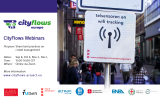
The EIT-KIC project CityFlows aims to improve the liveability of crowded pedestrian spaces through the use of Crowd Monitoring Decision Support Systems (CM-DSS) to manage pedestrian flows. In three partner cities, Amsterdam, Milan and Barcelona, the CityFlows project tests and evaluates various innovative crowd monitoring techniques in real-life settings where large crowds meet, such as mass events, tourist spaces and transfer hubs. The CityFlows project also prepares a CM-DSS for market launch which incorporates state-of-the-art monitoring techniques.
To facilitate knowledge exchange between project partners and stakeholders, the CityFlows project is hosting a webinar series. Through four, one hour webinars you will get insights from project partners and engage in a discussion with crowd-management researchers and practitioners.
During this first edition on Tuesday, September 8, project partners will share how they are repurposing crowd management tools to contribute to social distancing research and policy recommendations in times of corona. Crowd-management researchers and practitioners are encouraged to join this interactive webinar and to share their best practices and lessons learned.
CityFlows Webinar #1: Crowd-management in times of corona - 8 September 2020
14:50 – 15:00 Zoom waiting room open
15:00 – 15:05 Welcome and introduction to CityFlows webinar series, Cornelia Dinca
15:05 – 15:20 Experience from Amsterdam, Eelco Thiellier, City of Amsterdam, Traffic & Public Space Department
15:20 – 15:35 Experience from Milan, Valentino Sevino, City of Milan, Environmental Mobility and Territory Agency (AMAT)
15:35 – 16:00 Q&A with audience
16:00 Program end
To join this webinar, please register in advance via: <https://us02web.zoom.us/meeting/register/tZclceqtqTopEtZ0cP35pYUMxda6Wu1wqDbK>
After registering, you will receive a confirmation email containing information about joining the meeting.
______________________________________________________________________________________________
Save the date!
Three additional webinars are scheduled through the end of the year. Topics and speakers will be announced closer to the date.
• Tuesday, October 6, 15:00-16:00 CET
• Tuesday, November 3, 15:00-16:00 CET
• Tuesday, December 1, 15:00-16:00 CET
Are you a practitioner or researcher working on a relevant crowd-management project and would like to share your work and findings with the CityFlows network? Send a short email explaining your project to CityFlows Communications Officer, Cornelia Dinca via cornelia@amsterdamsmartcity.com.
The 5G Digital Divide
By Jon Glasco
Consider a future scenario when social and digital inclusion are interconnected in the lives of most citizens. Think of this as an optimistic scenario in which higher social inclusion is enabled by new bridges across the digital divide. Where does 5G technology fit in this scenario? Will 5G serve as one of the ‘new bridges’?
Stay up to date
Get notified about new updates, opportunities or events that match your interests.
